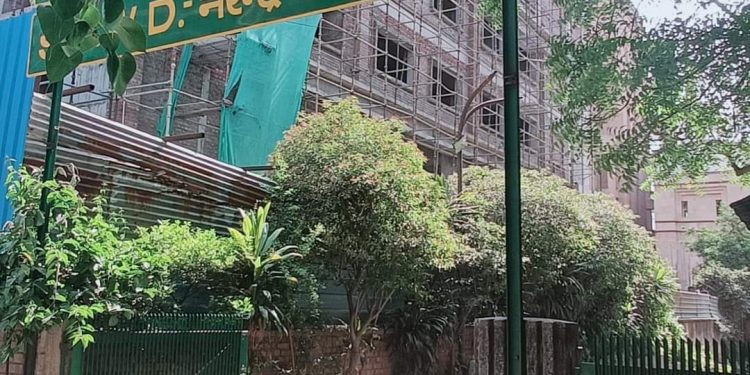Corporate Focus

Narendra Modi’s Leadership: Building a Prosperous India and a Peaceful World
Narendra Modi: A Visionary Leader’s Global Impact
Prof. Jasim Mohammad
In the annals of leadership, some figures stand out not merely as heads of state but as architects of profound change. Narendra Modi, the 14th Prime Minister of India, embodies this transformative spirit, a dynamic leader whose impact resonates far beyond his country’s borders. From redefining India’s developmental trajectory to advocating for global harmony, Modi’s journey reflects the essence of a visionary leader.
His ascent to the Prime Minister’s office in 2014 marked a turning point for India. Born on September 17, 1950, in Vadnagar, a small town in Gujarat, he navigated a path laden with challenges to become a symbol of hope for millions. His tenure as Chief Minister of Gujarat (2001-2014) showcased his dedication to driving economic growth, emphasising innovation, and nurturing a spirit of entrepreneurship.
His governance philosophy is anchored in his fervent belief in ‘Sabka Saath, Sabka Vikas’—inclusive development for all. Initiatives like ‘Make in India’ and ‘Digital India’ were designed to accelerate economic growth and enhance connectivity, aligning with his vision of a prosperous India. Through the ‘Pradhan Mantri Jan Dhan Yojana,’ he ensured financial inclusion for millions, empowering them to participate in the nation’s progress.

However, his impact extends beyond economic realms. As an apostle of world peace, his efforts have aimed at fostering global harmony. One hallmark of his leadership is the ‘International Day of Yoga,’ celebrated annually on June 21. This initiative, proposed by him in his maiden address to the United Nations General Assembly, underscores his endeavour to promote holistic wellness and unity among nations.
His emphasis on sustainable development aligns with his commitment to safeguarding the environment. The ‘International Solar Alliance,’ a collaborative platform for solar-rich countries, exemplifies his vision to combat climate change through innovative strategies.
In matters of foreign policy, his approach is rooted in pragmatic diplomacy. His outreach to neighboring nations, such as the ‘Neighborhood First’ policy, demonstrates a commitment to nurturing peaceful coexistence and regional stability. The ‘Act East Policy’ has forged stronger ties with Southeast Asian nations, enhancing economic and cultural linkages.
His role in elevating India’s global stature was evident in the formation of the BRICS grouping (Brazil, Russia, India, China, South Africa) and his consistent engagement with G20 nations. His initiative to establish the ‘Coalition for Disaster Resilient Infrastructure’ emphasises preparedness in the face of natural calamities.
One of the most significant accomplishments of his tenure was the abrogation of Article 370, thereby integrating Jammu and Kashmir fully into the Indian Union. This decision aimed at ensuring equal opportunities and growth for the region, reflecting his commitment to justice and equitable development.
The visionary leader’s efforts towards building a secure nation led to the surgical strikes in 2016 and 2019, sending a resolute message against terrorism. The ‘Swachh Bharat Abhiyan,’ a nationwide cleanliness campaign, symbolized his call for civic responsibility and a cleaner, healthier India.
His global outreach extends beyond policy corridors. His charisma and eloquence have captivated audiences worldwide. His addresses at the United Nations, the British Parliament, and the European Parliament have resonated with messages of unity, cooperation, and shared responsibility.
While his leadership embodies progress, he envisions a world at peace. The ‘Vasudhaiva Kutumbakam’ philosophy, translated as ‘the world is one family,’ reflects his conviction that global challenges can only be overcome through collective efforts. His call for ‘Yoga for Peace’ echoes the ancient Indian wisdom that harmonising oneself can contribute to harmonising the world.
In his role as a harbinger of prosperity, his initiatives have propelled India onto the global stage. However, it’s his embodiment of an apostle of world peace that defines the legacy he aspires to create. As he leads a nation of diversity and dynamism, he also addresses a world grappling with complex issues. The journey of Narendra Modi is more than political; it’s an exploration of human potential and the unification of diverse aspirations toward a better world—a world of prosperity and lasting peace.
India is proudly taking the centre stage on the global platform this year, and it’s an occasion for celebration. With the prestigious G20 Heads of State and Government Summit being hosted in Delhi in September, India’s role as the G20 presidency shines brightly. Prime Minister Narendra Modi, the visionary leader at the helm, has played an instrumental role in making this event a grand success.
Under his sagacious leadership, India has showcased its remarkable ability to lead and influence across a wide spectrum of issues. Whether it’s championing sustainable development, fostering global cooperation in healthcare, or spearheading climate initiatives, His commitment to these causes has been unwavering. His dedication to shaping a better future for not just India but the entire world has been palpable throughout his tenure as G20 president.
His leadership has brought together world leaders to collaborate on vital global challenges. His efforts have not only bolstered India’s international standing but have also ensured that the nation’s voice is heard loud and clear on the world stage. As we look forward to the G20 summit, there’s a sense of optimism and pride in the air, knowing that Prime Minister Modi’s leadership is steering India towards a brighter and more influential future in global affairs.
Prime Minister Narendra Modi has earned international recognition with approximately 20 highest civilian awards from various countries, a testament to his exceptional diplomatic and administrative skills. Recently, French President Emmanuel Macron bestowed upon him the Grand Cross of the Legion of Honour, France’s highest military and civilian award, making Modi the first Indian Prime Minister to receive this prestigious honor. This accolade aligns him with revered global leaders such as Nelson Mandela and Angela Merkel
Among the numerous awards, one notable honor was conferred by the United Arab Emirates during its Year of Tolerance in 2019. Named after UAE’s founder Sheikh Zayed bin Sultan Al Nahyan, this award celebrated Modi’s multifaceted contributions. Similarly, Bahrain awarded him the King Hamad Order of the Renaissance in 2019, symbolizing strengthened India-Bahrain relations.
These prestigious awards from various nations reflect Prime Minister Modi’s global influence and recognition for his contributions to peace, diplomacy, and international cooperation.
India, under the leadership of Modi, launched the world’s largest COVID-19 vaccination campaign in January last year. A remarkable 200.59 crore vaccine doses have been administered to eligible beneficiaries.

This noteworthy achievement garnered praise from prominent figures, including Bill Gates, who congratulated @narendramodi for reaching this milestone. Gates also expressed gratitude for the collaborative efforts between the Indian government and vaccine manufacturers in the fight against COVID-19 in his tweet. Modi’s leadership and commitment to public health have played a pivotal role in India’s successful vaccination drive, making it a global example of a massive vaccination effort.
India has played a significant role in the global fight against COVID-19 by providing more than 235 million doses of vaccines to a total of 98 countries. This substantial contribution underscores India’s commitment to international cooperation and its dedication to helping nations in need during this global health crisis.
The PM Narendra Modi’s leadership embodies inclusive development and a commitment to global peace. From economic growth to diplomacy, his impact extends internationally. His philosophy of unity and collective action shapes his vision for a prosperous and peaceful world. His legacy is one of progress and a commitment to collective efforts for a better future.
(Author is Professor & Chairman, Centre for Narendra Modi Studies (CNMS), New Delhi. He may contact profjasimmd@gmail.com)













